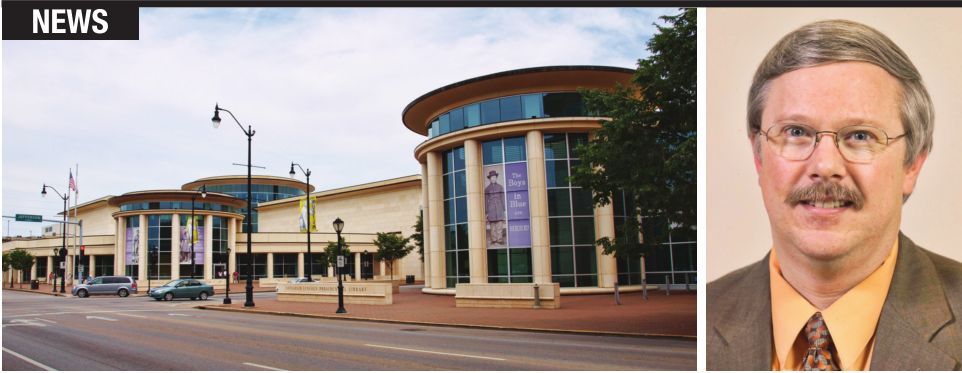
Says he did nothing wrong at Lincoln papers project
His former bosses at the Abraham Lincoln Presidential Library and Museum say that Daniel Stowell, former director of the Papers of Abraham Lincoln Project, was an insubordinate employee who botched efforts to publish every document ever read or written by the Great Emancipator.
But Stowell, who was fired last month and is appealing his dismissal, says that he’s done nothing wrong and should be reinstated.
“None of these charges will be proven,” said his attorney, Carl Draper, at a Tuesday hearing before an administrative law judge.
At stake is a career with the papers project that began in 1996. Stowell has been director of the project since 2000.
The charges include:
• Allowing a researcher to telecommute from St. Louis, contrary to agency policy
• Failing to correct computer glitches that made it difficult or impossible for researchers to view online images of Lincoln documents
• Failure to obtain copyright releases from owners of Lincoln documents so that images can be published
• Making an unauthorized deal to have volunteers transcribe Lincoln documents so that they can be put online in searchable form The hearing that began this week was continued until May, when Samuel Wheeler, Illinois state historian who has clashed with Stowell, is expected to testify.
Stowell is accused of allowing Stacy McDermott, a former researcher employed by the University of Illinois Springfield, to telecommute from St. Louis after Wheeler, who was named state historian last summer, issued orders that she work in Springfield. McDermott, who had long been based at the ALPLM, began working in St. Louis several years ago after her husband, a reporter with the St. Louis Post-Dispatch, was transferred out of Springfield. While Stowell was McDermott’s supervisor, Draper during Tuesday’s hearing pointed out that McDermott was employed by UIS when Wheeler informed her and Stowell in an email that she must work in Springfield.
“She and UIS protested this,” Draper said.
“Both she and UIS advised she would not move back to Springfield to do her work.”
McDermott remains a UIS employee and works mainly in St. Louis. She works as a consulting historian for the UIS Center for State Policy and Leadership, according to UIS spokesman Derek Schnapp, and is helping plan a Lincoln studies center as well as lectures about Lincoln.
When researchers complained that they couldn’t access documents online, Stowell says that he contacted the company that hosts the website that contains images. In many cases, he says, problems were resolved by having researchers adjust settings on their computers, he said. He also says that the company estimated that a better fix to software in use since 2008 would cost $1,400, but his supervisors failed to come up with the money.
Stowell’s bosses also say that he screwed up by not getting copyright releases from owners of Lincoln documents, but Stowell says that the plan all along was to seek releases after documents were ready to be posted so that the owners could see exactly how documents would appear on computer screens. Draper said that owners of documents that are in private hands would, in many cases, seek fees for use of records, so Stowell secured images of documents, if not permission to publish, so that transcriptions could be made and posted online for researchers.
“It’s not the handwriting that’s important, it’s the words,” Draper said. “He’s now being fired for doing his job the way it was assigned five to 10 years ago.”
Stowell testified that fewer than 1,000 documents are not in the public domain and so cannot be posted absent copyright releases from private owners. The vast majority, he said, come from courthouses, the Library of Congress and the National Archives.
Under questioning from assistant state attorney general Dylan Grady, Stowell testified that he planned to seek copyright clearance from owners of documents who gave permission for images to be taken, even if the documents have since been sold. It wasn’t clear from his testimony how clearance could be given from someone who no longer owned a document.
Stowell’s accusers also say he had no authorization to make a deal with Zooniverse, an online entity that enlists volunteers to do research. Zooniverse has used volunteers to help classify stars in far-off galaxies, transcribe documents from Shakespearian times and perform other research in several disciplines. Zooniverse has won a federal grant from the National Historical Publications and Records Commission to transcribe Union army telegrams from the Civil War. Stowell says that he spoke with Zooniverse about having volunteers transcribe Lincoln documents, but pulled the plug when Wheeler objected. It’s not clear why Wheeler didn’t want the papers project to work with Zooniverse.
“He entered into a partnership without notice to his supervisors,” Lori Tinsley, director of human resources for the Illinois Historic Preservation Agency testified. “He made the decision on his own without speaking to anyone else and without authority.”
Stowell testified that he never formed a formal partnership with Zooniverse. However, the logo for the Papers of Abraham Lincoln Project appears on a Zooniverse web page on the transcription project, and Stowell is named as a “team member.”
Stowell’s future with the papers project was an issue a year ago, when the National Historical Publications and Records Commission postponed action on a grant proposal and cited uncertainty about the project’s leadership as a reason why. Stowell was then on paid leave, but was returned after less than two months. However, the federal grant was approved in November, after Stowell was again placed on administrative leave pending his dismissal.
Contact Bruce Rushton at [email protected].